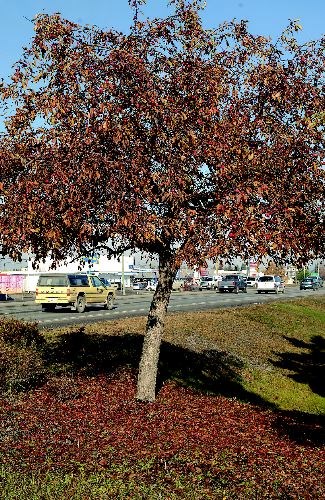Concerns raised by a Prince George resident about unharvested crab apple trees on public right of ways along Highway 97 may result in action by the Ministry of Transportation and Infrastructure.
Unharvested fruit trees are one of the top attractants for bears in Prince George, according to the Northern Bear Awareness Society. Fruit-laden ornamental crab apple trees can be found along Highway 97 from Fifth Avenue to 15th Avenue on ministry right of ways.
"Minimizing impacts to wildlife is a priority for the ministry, and now that this concern has been brought to our attention, the ministry will be consulting with stakeholders and other government agencies to determine the appropriate course of action to address these concerns," ministry spokesperson Kate Trotter said via e-mail.
"There are a variety of shrubs and trees along the roadside, including some ornamental crab apple trees that were planted in the 1980s as part of the ministry's efforts to improve aesthetics of the highway corridor through Prince George. At that time, deterring bears was likely not a concern during the selection of the trees."
According to information released by the Conservation Officer Service, between April 2008 and December 2010 conservation officers destroyed 161 black bears and 13 grizzly bears in Prince George. A further 12 grizzlies and 8 black bears were relocated.
Over the three years, the Conservation Service received an average of 1,190 calls per year about bears in the city.
The mature crab apple trees predate the creation of the B.C. Bear Smart Program in 2002 and the formation of the Northern Bear Awareness Society in 2008.
"The preference for vegetation along highway corridors is low-growing vegetation and shrubs," Trotter added. "Low-maintenance species are preferred, and ornamental crab apple trees would not likely be planted under the current policy."
Ministry of Transportation and Infrastructure policy has changed over the past few years to reduce conflicts between humans and wildlife, she said. Mineral licks on Highway 16 have been removed, using erosion control seed mixes not preferred by wildlife and clearing brush along right-of-ways to ensure visibility are some of the initiatives taken by the ministry.
City of Prince George solid waste supervisor Chris Bjorn said the city no longer plants fruit-bearing trees on public lands and road right of ways.
"But 30-40 years ago they planted lots of fruit trees all over town," Bjorn said.
Many fruit-bearing trees are planted on city right-of-ways on residential streets, he explained.
"Those trees, the homeowner is expected to maintain them because it is an improvement to their home," he said. "We just don't have the manpower to do that."
City crews will prune back trees which impede traffic or visibility, but property owners are expected to do basic maintenance such as harvesting fruit, raking fallen leaves and watering, Bjorn said.
A spokesperson for the Northern Bear Awareness Society could not be reached as of press time.



